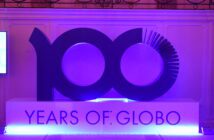[youtube]tvjNeHF4vIQ[/youtube]
Left to right: Chris Grant, CEO, Electus; Elle Macpherson, executive producer and host; Ben Silverman, founder and chairman, Electus; Peter White, deputy editor, TBI Magazine (moderating).
Fashion Star, the fruit of a collaboration between Electus and model/lingerie designer Elle Macpherson, is a reality show that puts would-be fashion designers in front of major buyers from Saks Fifth Avenue, Macy’s and H&M. They design clothes and hold a fashion show, during which buyers bid for designs they want. As a masterful cross-media final touch, audience members can immediately order the winning designs online after the show.
« The show really is about giving these designers the opportunity of a lifetime to have a caereer made, » said Ben Silverman. « Buyers are using real money » and taking real risks, he added, which differentiate the show from others: the people you’re trying to impress are also taking risks on you.
« To have three independent fashion buyers come together and actually sit, and spend money and buy clothes and compete, » is amazing, Elle Macpherson added.
« I haven’t seen a programme that has so many layers, from the mentors to the retailers to the models to the fashion shows. »
She also extolled the virtues of working in executive production. This isn’t her first time, but it is her first time doing it for an American show. « The executive production part has been really interesting for me… coming to America, to work with such powerhouses… to be really producing has been a big challenge and a lot of fun. And we had so much support! » She added that co-stars Jessica Simpson, John Barbados and Nicole Ritchie are pleasant to work with and very funny.
« I love the combination of fashion and business and heart. I worked for 30 years in the fashion industry, I don’t think I can afford to associate myself with something that I don’t think is going to be successful. [Fashion Star] is a global product, » Macpherson emphasised.
« Everybody shops, » said Chris Grant. « And it’s a totally unique idea and the format is so different from anything else before it, and that is a tremendous selling point. The finished episodes have sold in more than 75 countries… we’re announcing today that we’ve added some additional territories too. »
« There was conversation about also wanting to encourage America to go back and be consumers again, » said Silverman. As a result, the priority became getting the involvement of Main Street brands, « brands you can touch, you can see … on the streets. » He also hastened to add that the brands involved « didn’t pay any money to be in this show, there’s no advertising piece here. They are the props. »
« What’s exciting to me, to us, is everybody loves the show, » said Grant. And given what we’ve done in the US, it makes it easier in terms of lining up those pieces overseas, because you have such a high bar in America and Elle is such a fantastic partner. »
« People understand when they see the calibre of work that we’ve done, » Macpherson stated simply. « They know what they need to do and they’re stepping up to the mark! » Macpherson will be directly involved in creating across-the-board for formats overseas.
« I think that is where the power of the show, the ability that it has to work everywhere, » said Grant. « It is an ambitious project, and we’ve done a tremendous job thus far selling it, but we’re gonna need to see the process true. As we have this dream team together, we’ll make that happen. »
Countries to whom the show’s been sold include « Germany, France, Turkey, Australia, and other territories that I can’t tell you about, all of them are strategically placed with the exact group that we believe can deliver for us, » Grant went on. « Because that’s the major. »
« People really care about what’s behind the curtain and want to be inside real business dynamics, » but they also want the emotional, dreamy element of living your ambition, Silverman said.
Thankfully though, the show isn’t floating solely on clouds of dreams. « I don’t think business has to be so serious, although this is incredibly serious because there’s real money exchanging, » Macpherson said. « The other thing we haven’t mentioned is that all the clothes are being sold out within a few hours. So the concept is working, the model is working. People are buying into it. »
For this reason, production must be quick, making China the ideal choice for churning that inventory out as quickly as possible. « When the clothes first arrived for us to inspect, that was incredible, » Silverman enthused. « I will say everything is made in China. That was something else we discovered! And the pace with which people can turn around – can create fast fashion like Zara, companies that can condense production to meet trends, » is both impressive and crucial to both entertainment and fashion today.
« This is a show born of its time, » he continued. « It doesn’t live or breathe in without the ability to turn around and make high-end fashion quickly. My wife, after the first episode fell in love with a skirt… »
« …the skirt she wore last night? she looked so good in it! » Macpherson exclaimed.
« Yes! » said Silverman. « She bought the skirt and when it came she was like ‘Oh my God, it’s just like on the show!' »
And that’s what Fashion Star sells: a wildly accessible dream, « as seen on TV. »




